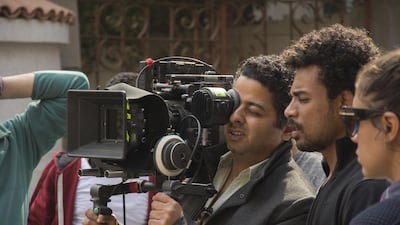In the summer of 2014, Egyptian director Mohamed Shaker Khodeir, then 31, received a call from Syrian producer Mohammad Mashish about a potential collaboration on a Ramadan mosalsal, the popular soaps that dominate TV networks for 30 days a year.
"He wouldn't give away any specifics, so I didn't take him seriously," Shaker recalls, but a few days later, Mashish, alongside scriptwriter Tamer Habib, asked him to direct a fictional TV biopic about a young singer's troublesome journey to fame. "They both wanted to cast a big star and I was a director with no experience in soaps," he says, about the initial hesitation to hire him to direct Tareeqi (My Way), an acclaimed series starring Egyptian songstress Sherine Abdel Wahab.
With a repertoire that boasts one feature film, two seasons of a talk show featuring the young, influential religious scholar Moez Masoud, and a number politically-charged videos including Sout El Horreya by musicians Amir Eid and Hany Adel, recorded when then-president Hosni Mubarak was toppled from power in 2011, Khodeir jumped in with both feet. "What got me hooked was the challenge to work with Sherine [Abdel Wahab], someone who had never acted before."
This month, after three years and two successful Ramadan soaps, Shaker, Mashish and Habib are returning to the screen with La Tutf'e al-Shams (The Sun Will Never Set), a family drama based on Ihsan Abdel Quddous's 1960 novel of the same name. At the centre of the story is a family of five siblings and their mother, and the series explores love and relationships.
Millions of Egyptian pounds are spent on Ramadan soaps every year, leaving viewers spoilt for choice with 50 or so titles, each airing for 30 straight days. “This kind of cramming does not happen elsewhere in the world,” says Shaker.
Shaker dislikes the recent trend of casting established stars who command huge sums, regardless of the quality of their performance, often at the cost of creative innovation.
Amid an increasing demand by satellite channels, the Ramadan soap industry is now dominated by a generation of young filmmakers, some of whom made their name in the now-less-favoured cinema industry. Last year, Shaker directed Grand Hotel, a well-received 1950s murder mystery set in a gloriously picturesque 19th century hotel in Aswan, in the south of Egypt. Adapted from a Spanish series, it was among the most-watched soaps, along with Foq Mostawa El Shobohat (Above Reproach), which starred veteran star Yousra as a politician, after the 2011 revolution.
La Tutf'e al-Shams will air alongside the hugely anticipated adaptation of Bahaa Taher's award-winning 2007 novel Wahat Al-Ghoroub (Sunset Oasis). The book is set at the end of the 19th century in Siwa, an oasis west of Cairo, and examines political, racial and historical tensions.
Another soap to watch is the sequel to the political drama Al-Gama'a (The Brotherhood), which recounts the rise of the Muslim Brotherhood.
Shaker remains unruffled by the pressure of it all. “At the risk of sounding clichéd, I would rather 10 people watch and truly relate to the story being told,” he tells me, rather than garnering masses of “popcorn viewers”.
As he sits calmly during filming on location, alternating between reviewing scenes and wardrobe choices, Shaker, whose passion lies in making films, says: “The workflow of mosalsalat kills anything that has to do with art. My main task turns into implementing as much as I can of my initial vision.”
He hasn't read Quddous's novel and only plans on doing so after the show. "I didn't watch [the original] Grand Hotel either. I don't think it's a good idea to restrict yourself in that way. It kills your imagination," he says, preferring to refer to the novel for inspiration.
But one privately-owned newspaper is already drawing parallels between the forthcoming La Tutf'e al-Shams and the star-studded 1961 film of the same name. In its preview of the soap, it posted photos of the original cast juxtaposed against this year's line-up.
“The case with adaptations globally is that some will say, if you’ve read the book you won’t enjoy the movie. Others will say, you will really enjoy the movie after reading the book,” says Shaker. “If I read the novel, I could easily be misled by what is in it, which might not end up in the script.” Some of the characters created by scriptwriter Habib did not originate in the novel.
“It’s a social drama, so the characters are key… and theirs are the kind of stories that stay with you.”
• La Tutf’e al-Shams will air on CBC starting on the first day of Ramadan. Episodes are also posted on YouTube.
Heba El-Sherif is a freelance writer based in Cairo.

